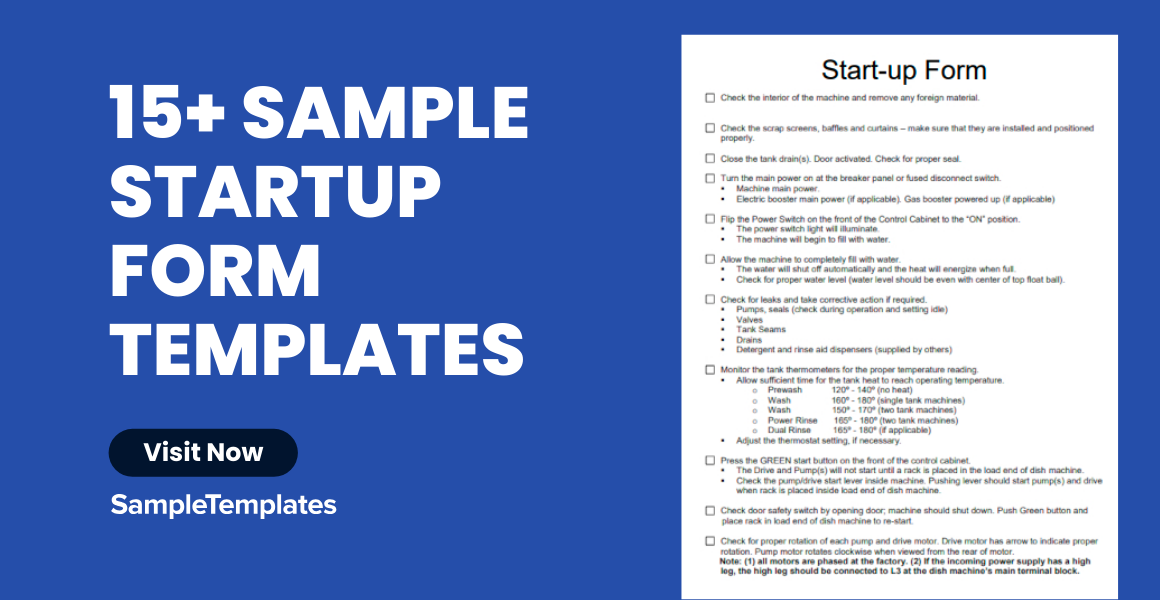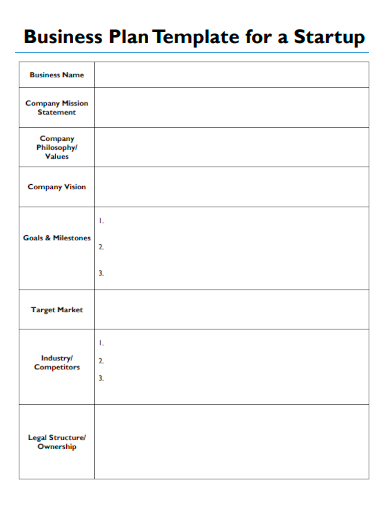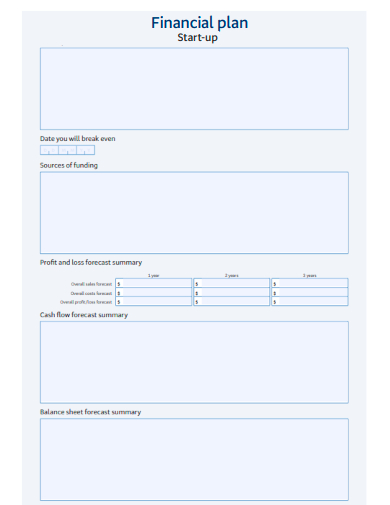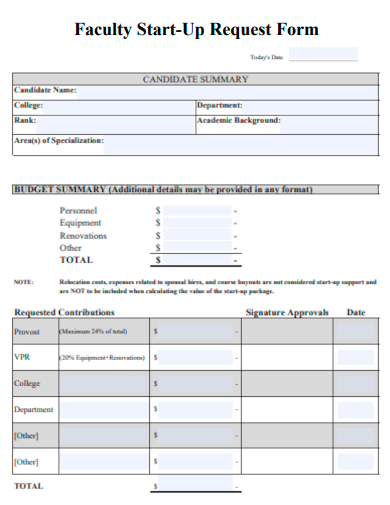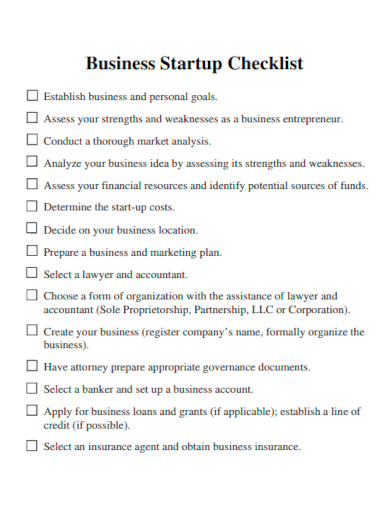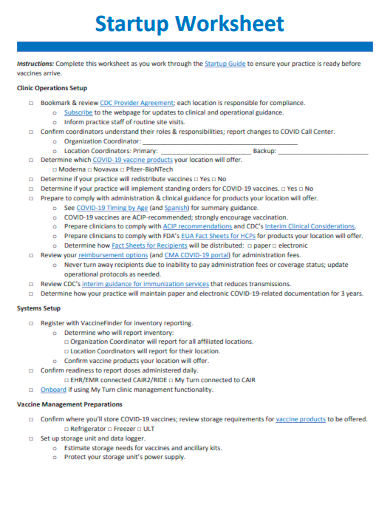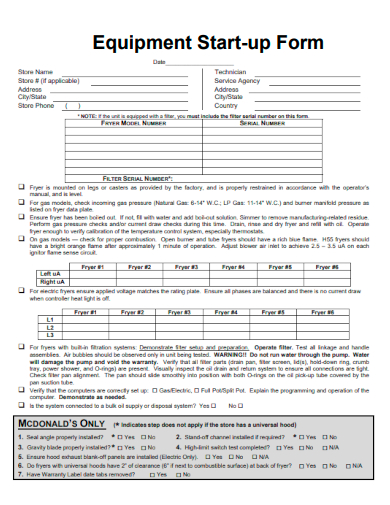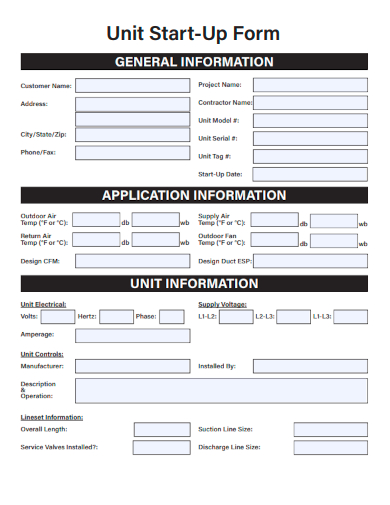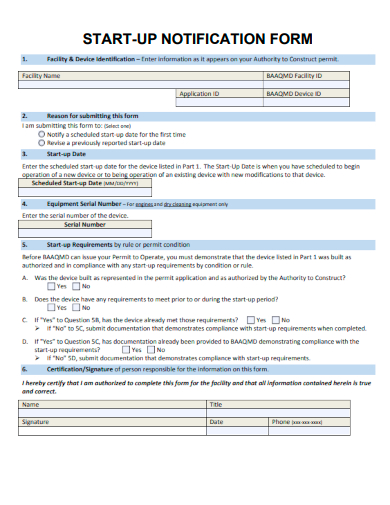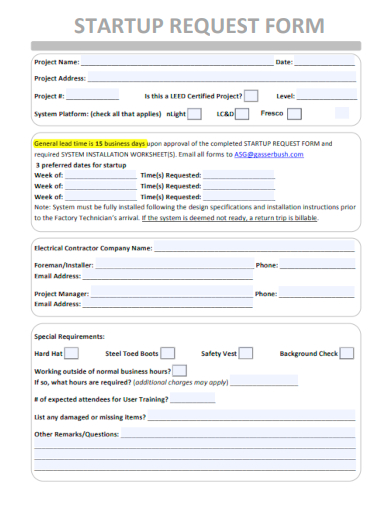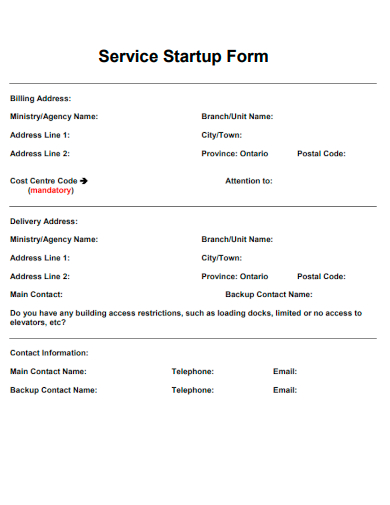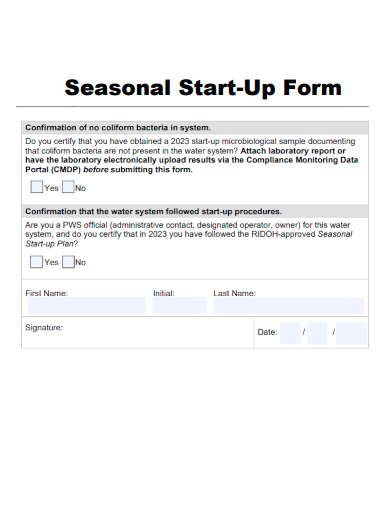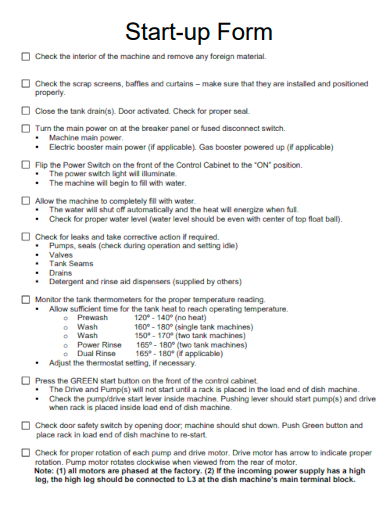Setting sail on your entrepreneurial voyage? Navigate the waters with our Sample Startup Form. It’s not just a form; it’s the foundation of your business plan. Meticulously crafted to encapsulate the spirit of budding ventures, it ensures every aspect of your strategy is addressed. A beacon for ambitious innovators, its content is optimized for search, echoing the modern founder’s aspirations. Dive in, and lay the groundwork for your startup’s success story.
FREE 15+ Sample Startup Form Templates
1. Sample Startup Evaluation Form Template
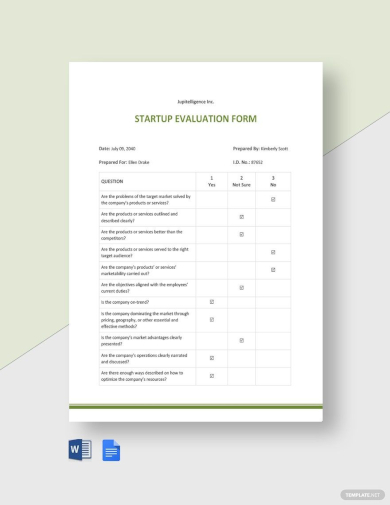
2. Sample Startup Application Form Template
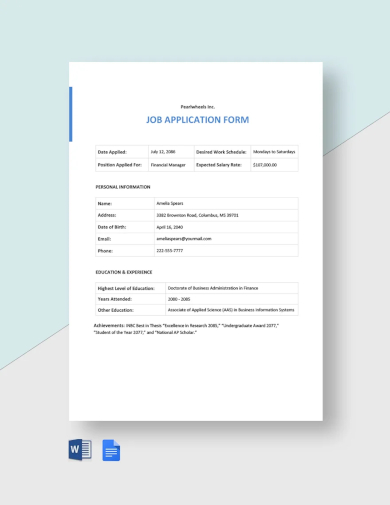
3. Sample Startup Cost Analysis Form Template
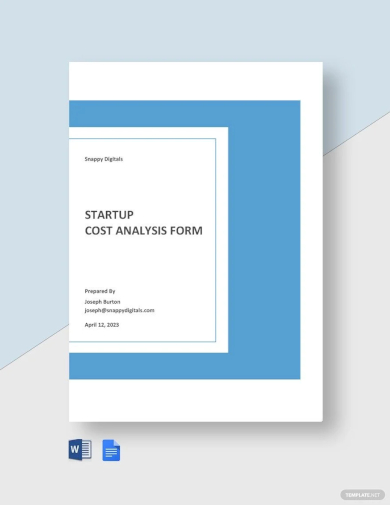
4. Sample Startup Company Form Template
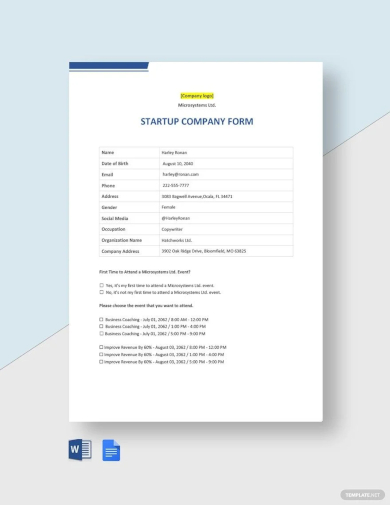
5. Sample Business Plan Startup Form Template
6. Sample Financial Plan Startup Form Template
How to Create a Startup Form
Before diving into the creation of a startup form, it’s vital to understand its primary purpose. A startup form serves as a preliminary document or interface capturing essential details about an entrepreneur’s business idea, sample goals, and necessary resources. It can be a bridge between the dreamer and potential investors, partners, or even team members.
Choosing the Right Platform
With numerous tools and platforms available today, selecting the right one for your startup form is crucial. Depending on your target audience and tech-savviness, you could opt for Google Forms or even create a bespoke form on your website using tools like WordPress plugins.
Essential Components
Here are the components that a comprehensive startup form should have:
- Business Overview: A section to describe the business idea, its origin, and its value proposition.
- Goals & Objectives: Short-term and long-term aspirations of the business.
- Market Analysis: Understanding of the target market, competitors, and potential market share.
- Team and Key Personnel: Introducing main team members, their roles, and experiences.
- Resource Requirements: Details about the financial, human, and technical resources needed.
- Funding Information: If looking for investment, details about the required funding, use of funds, and potential equity or returns.
Feedback and Iteration
Once the initial version of your startup form is ready, seek feedback from mentors, peers, or potential users. This will help you refine the questions, make the form more user-friendly, and ensure it captures all the necessary information.
Ensuring Security and Privacy
When collecting data, especially sensitive business details, ensure your form is secure. Using encrypted platforms, SSL certificates, and ensuring GDPR compliance (if catering to European users) is crucial.
Exploring the Different Startup Forms and Their Examples
In the vibrant world of startups, every phase of the journey requires meticulous documentation and understanding. Distinct forms tailored for specific purposes can significantly streamline processes, from procuring investments to integrating new team members. Here’s a breakdown of some common startup forms and sample content for each:
1. Investor Outreach Form
When on the lookout for funding, startups need a direct and compelling way to present their vision, progress, and financial aspirations to potential investors.
Sample Content:
Distill your startup’s mission into one impactful sentence. How much capital are you currently seeking, and how do you envision its allocation? Provide any existing metrics or milestones achieved to date.
2. Team Expansion Form
As a startup grows, so does its team. Bringing on new members smoothly necessitates gathering relevant details about their background, skills, and logistical information.
Sample Content:
Enumerate your previous professional experiences, highlighting any roles particularly relevant to this position. Do you have any specialized certifications or training pertinent to our industry?
3. Product Feedback Collection Form
Harnessing user feedback is invaluable, especially post-launch or after introducing new features. A dedicated form can help gauge user sentiment and gather actionable insights.
Sample Content:
Rate our product on a scale from 1-10, with 10 being extremely satisfied. What elements of our offering resonated most with you? Are there areas you believe we could improve?
4. Market Analysis Form
Before branching out or introducing a product, startups benefit immensely from understanding their target demographic and the broader market landscape.
Sample Content:
Identify any similar products or services you’ve engaged with in the past. What were their strengths and areas of improvement? What would make our offering particularly appealing to you?
5. Partnership Exploration Form
Many startups find strength in collaboration. A dedicated form can help identify and solidify potential synergies with other entities.
Sample Content:
Give us a brief overview of your company and its primary functions. How do you perceive a collaborative effort between our entities benefitting both parties?
By leveraging these specialized forms, startups can effectively navigate various stages of their journey, ensuring they’re well-equipped with the information needed to make informed decisions.
7. Sample Faculty Start-Up Request Form Template
8. Sample Business Startup Checklist Form Template
9. Sample Startup Worksheet Form Template
10. Sample Equipment Startup Form Template
11. Sample Unit Start-Up Form Template
12. Sample Startup Notification Form Template
13. Sample Startup Request Form Template
14. Sample Service Startup Form Template
15. Sample Seasonal Start-Up Form Template
16. Sample Blank Startup Form Template
Deciding on the Best Business Form for a Startup
When it comes to launching a startup, one of the foundational decisions an entrepreneur must make is choosing the appropriate business form or structure. This choice can significantly influence the startup’s taxation, liability, operation, and even its ability to raise funds. Let’s delve into the various business forms available and explore which might be best suited for startups.
1. Sole Proprietorship:
This is the simplest form of business entity. In a sole proprietorship, the business and the owner are legally treated as one. This means that while it’s easy to set up and manage, the owner assumes all risks, debts, and liabilities.
Pros: Ease of establishment, direct control, straightforward taxation.
Cons: Unlimited personal liability, challenging to raise funds.
2. Partnership:
A partnership involves two or more individuals who agree to share in the profits and losses of a business venture. Partnerships can be general (equal responsibility and liability) or limited (limited partners only invest and don’t manage the business).
Pros: Shared responsibility, pooled resources, tax benefits.
Cons: Potential for conflicts, shared liabilities, profits split among partners.
3. Limited Liability Company (LLC):
An LLC blends features of partnerships and corporations. Owners, called members, enjoy limited liability like corporate shareholders but have the flexibility of income distribution like partners.
Pros: Limited liability, tax flexibility, less paperwork compared to corporations.
Cons: More complex than a sole proprietorship, varied regulations by state.
4. Corporation:
A corporation is a legal entity separate from its owners, protecting them from being personally liable for the company’s debts. The two most common types of corporations for startups are C-Corporations and S-Corporations.
C-Corporations: These are the standard corporation form. They can have unlimited shareholders, making them ideal for startups looking to raise significant capital. However, they are subject to double taxation—once at the corporate level and again on dividends.
S-Corporations: These avoid double taxation by passing corporate income, losses, deductions, and credits to shareholders for federal tax purposes. However, they have a limit on the number of shareholders and are subject to specific eligibility criteria.
Pros of Corporations: Limited liability, ability to raise funds through stock sales, perpetual existence.
Cons: Double taxation (for C-Corps), more stringent regulations, considerable paperwork.
So, What’s Best for Startups?
The best business form for a startup depends on its goals, the nature of its operations, its financial situation, and the risk appetite of the founders.
For solopreneurs: A sole proprietorship or an LLC might be suitable.
For those with co-founders: Partnerships or LLCs can be considered.
For startups aiming to raise significant capital, especially from venture capitalists: C-Corporations, particularly those incorporated in startup-friendly states like Delaware, are popular.
For smaller startups looking to avoid double taxation but still have liability protection: An S-Corporation might be ideal.
In conclusion, selecting the right business form is a crucial step in a startup’s journey. It’s recommended that entrepreneurs consult with legal and financial professionals to make an informed decision tailored to their unique needs.
Related Posts
Parent Consent Form Samples & Templates
Sample Release of Liability Forms
Sample Training Feedback Forms
Sample Sworn Affidavit Forms
Agreement Form Samples & Templates
Vehicle Inspection Forms Samples & Templates
Sample Employee Advance Forms
Sample Child Travel Consent Forms
Sample Testimonial Request Forms
Sample Employee Details Forms
Sample Divorce Forms
Sample Attestation Forms
Employee Performance Appraisal Form Templates
FREE 9+ Sample Presentation Evaluation Forms in MS Word
FREE 10+ School Admission Form Samples & Templates in MS Word | PDF
